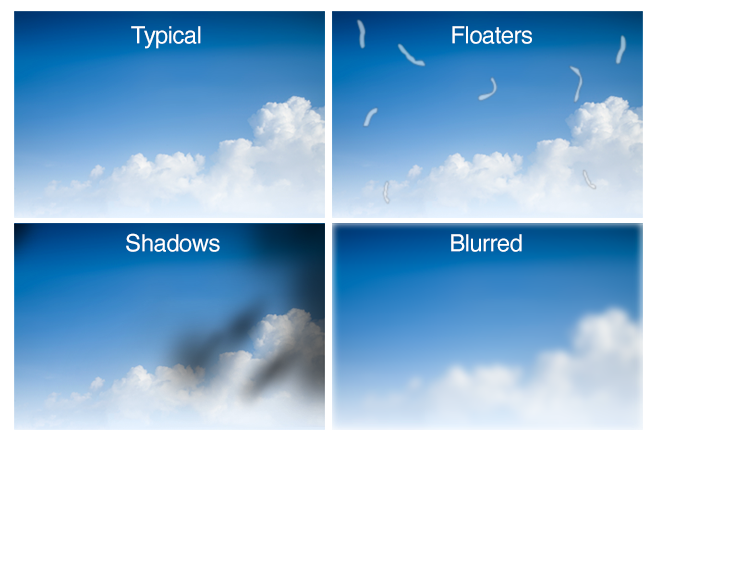Welcome to our guide on eye floaters! Have you ever noticed small shapes drifting across your sight? These are known as floaters, and many adults experience them. Understanding what they are is an important step to keep our vision as healthy as possible.
Introduction to Eye Floaters
Eye floaters are tiny specks that float around in your field of vision. They are most visible when you look at something bright, like the sky or a computer screen. Floaters are common, especially as people age. Many adults notice them, although they often don’t realize what they are at first.
Understanding floaters is crucial because they can sometimes indicate a more serious vision problem. While typically harmless, a sudden increase in floaters might be a sign to get your eyes checked. It’s important to know about them so you can monitor changes and seek advice if needed. By learning about eye floaters, you can feel more confident about your eye health and stay informed about when to see a specialist.
Understanding Eye Floaters and Their Symptoms
So, what exactly are eye floaters? They are small flecks of a protein called collagen that float in the clear gel-like substance inside your eye. This gel is called the vitreous. As we grow older, the vitreous starts to shrink and forms small clumps. These clumps cast shadows on the retina, creating the floaters you see.
Common signs include seeing small spots, threads, or cobweb-like shapes wander across your vision. They are more noticeable in bright light. Though they can be annoying, they are generally harmless. However, if you experience a sudden swarm of floaters coupled with light flashes, it’s crucial to contact an eye doctor. Such changes can sometimes signal retinal damage.
Floaters can vary in size and shape. They might appear like small dots or look more like strands. Their movement is noticeable when you shift your eyes because they drift along with the movement. Understanding these visual disturbances can help you distinguish between normal floaters and signs that need medical attention.
Diving into the Causes of Eye Floaters
One of the major eye floaters causes is aging. As we age, changes occur in the vitreous. It begins to shrink and liquefy, clumping together to form floaters. This is a natural part of getting older and is usually nothing to worry about.
Another cause is related to posterior vitreous detachment. This happens when the vitreous separates from the retina. The separation can cause a sudden increase in floaters. Although it is usually harmless, it requires monitoring to ensure no retinal tears occur.
Eye trauma can also lead to floaters. An injury might cause blood or protein particles to enter the vitreous, creating the appearance of floaters. More serious issues like retinal breaks or tears can be involved, which is why any eye trauma requires immediate attention.
Underlying medical conditions can also play a role. Issues like inflammation in the eye or retinal diseases could cause floaters. Diabetes and high blood pressure, which affect blood vessels in the eye, can also lead to changes in the vitreous. Keeping these underlying conditions in check can help manage floaters.
Everyday Impact of Eye Floaters on Vision
Floaters can make everyday tasks challenging. Reading, driving, or working on computers may become frustrating when these little spots appear to leap across your vision. Although they are small, they can sometimes obstruct your sight just enough to be annoying. Over time, constantly dealing with floaters might even have psychological effects. Some people report anxiety or stress from their persistent presence.
Self-correction is not effective with floaters. They often dissipate on their own over time, but you can’t make them disappear through eye exercises or by controlling your eye movements. It’s important to learn how to live with them or consider professional treatments.
Solutions and Treatments for Managing Eye Floaters
Noticing changes in your floaters? It might be time to visit an eye specialist. They can determine if your floaters are just annoying or if they’re a sign of something more serious. Routine eye check-ups can provide peace of mind, helping you manage your vision health effectively.
For those looking for non-surgical options, know that diet and lifestyle changes can sometimes help. Eating foods rich in antioxidants, staying hydrated, and reducing screen time may reduce floaters’ appearance. Supplements containing vitamins and minerals supporting eye health are also worth considering.
When floaters are particularly troublesome, advanced treatments like vitrectomy or laser treatment for eye floaters might be suggested. Vitrectomy involves removing the vitreous gel and replacing it with a solution to get rid of floaters. Laser treatment for eye floaters uses a laser to break up large floaters, making them less noticeable. These treatments are typically reserved for severe cases where floaters interfere significantly with vision.
Understanding Eye Floaters in India: A Population-Specific View
In India, eye floaters are common, as in many other places. Data shows a significant number of the adult population experiences them. Availability of healthcare services varies, and while urban areas may have easy access to specialists, rural areas might face challenges.
Cultural attitudes toward eye health differ across regions. In some communities, traditional remedies are commonly used. However, it is crucial to balance these with regular medical consultations to ensure complete and effective care for eye health.
Proactive Steps to Preventing Eye Floaters
Preventing eye floaters isn’t always possible, but you can take steps to maintain eye health. A balanced diet rich in fruits and vegetables supports overall eye wellness. Regular eye exams are essential to catch changes early.
Protect your eyes from accidental trauma by using eyewear during activities that might injure your eyes, like sports or home repairs. In your daily routine, incorporate habits like blinking to keep your eyes moist and relaxing your gaze from screens periodically.
Conclusion: Awareness and Management of Eye Floaters
Our guide on eye floaters covers a lot of ground, from understanding their causes to various treatments. Knowing what floaters are and when to seek help can empower you to take control of your eye health.
Trustworthy advice and regular check-ups with an eye doctor are key. Staying vigilant about any sudden changes will help maintain your sight. Proper awareness can also ease worries about floaters.


